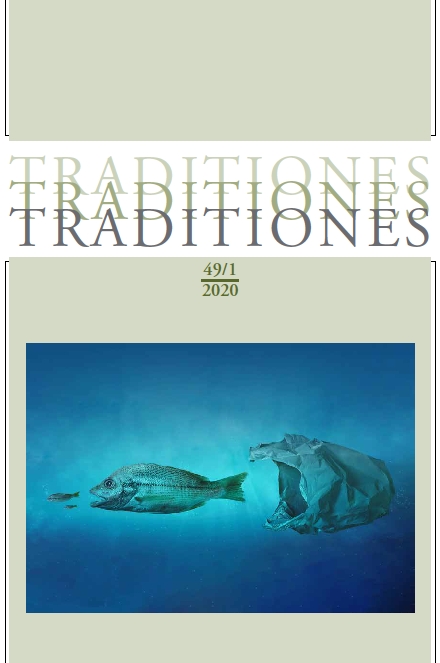Motivation for Change
Gamification as a Tool for Supporting Sustainable Behaviour
DOI:
https://doi.org/10.3986/Traditio2020490105Keywords:
environmental behavior, green skills, sustainability, interviews, co-creationAbstract
This article reports on applied research and the aspiration to find ways to increase sustainable behavior through the application of game mechanics and playful solutions. One of the main questions investigated through the research activities was what would motivate people to adopt more sustainable behavior and sustainable consumption. To create a better understanding of the problem, researchers and students looked into the awareness and different perceptions of sustainability in a variety of cultural settings, with special focus on waste separation, energy, and water consumption. In addition to documenting the details about current sustainable behavior, additional questions included how and where people find out about sustainability concepts, and how these concepts are currently being taught.
Downloads
References
Arora, Payal, and Sorina Itu. 2012. Arm Chair Activism: Serious Games Usage by INGOs for Educational Change. International Journal of Game-Based Learning 2 (4): 1–17. DOI: https://doi.org/10.4018/ijgbl.2012100101.
Bajuk Senčar, Tatiana. 2017. Researching the Culture of Comfort: The Use of Interviews in Ethnographic Studies of Mobility. In: Dan Podjed and Simona Bezjak (eds.), Research on the Road. Ljubljana: Založba ZRC, 43–61.
Bezjak, Simona. 2017. Greening Society. Social Science Approaches for Encouraging Pro-Environmental Behaviors and Lifestyles. In: Dan Podjed and Simona Bezjak (eds.), Research on the Road. Ljubljana: Založba ZRC, 169–190.
Bryman, Alan. 2016. Social Research Methods. Oxford: Oxford University Press.
Cerinšek, Gregor et al. 2019. Boosting Affordability, Acceptability and Attractiveness of Deep Energy Renovations of Residential Buildings—A People-Centred Ethnographic Approach. In: E3S Web of Conferences 111 (CLIMA 2019 Congress). Available at: https://doi.org/10.1051/e3sconf/201911103026.
Coakley, Darragh, Maja Pivec, and Anika Kronberger. 2019. Hacking the Compulsion Loop for Sustainability Education in Game Based Learning. In: Jutta Pauschenwein and Robert Gutounig (eds.), Tagungsband 18: E-Learning Tag der FH Joanneum. Graz: FH Joanneum Gesellschaft mbH, 14–26.
Feng, Ling. 2012. Teacher and Student Responses to Interdisciplinary Aspects of Sustainability Education: What Do We Really Know? Environmental Education Research 18 (1): 31–43. DOI: https://doi.org/10.1080/13504622.2011.574209.
Huber, Martina, and Lorenz Hilty. 2015. Gamification and Sustainable Consumption: Overcoming the Limitations of Persuasive Technologies. In: Lorenz Hilty and Bernard Aebischer (eds.), ICT Innovations for Sustainability: Advances in Intelligent Systems and Computing (Vol. 310). Cham: Springer, 367–386.
Kelly, Shawna, and Bonnie Nardi. 2014. Playing with Sustainability: Using Video Games to Simulate Futures of Scarcity. First Monday 19 (5). DOI: https://doi.org/10.5210/fm.v19i5.5259.
Kollmuss, Anja, and Julian Agyeman. 2002. Mind the Gap: Why Do People Act Environmentally and What Are the Barriers to Pro-Environmental Behavior? Environmental Education Research 8 (3): 239–260. DOI: https://doi.org/10.1080/13504620220145401.
Lander, Lorraine. 2017. Education for Sustainability: A Wisdom Model. In: Walter Leal Filho, Mark Mifsud, Chris Shiel and Rudi Pretorius (eds.), Handbook of Theory and Practice of Sustainable Development in Higher Education (= World Sustainability Series). Cham: Springer, 47–58.
Lee, Jung-Joo et al. 2018. Design Choices Framework for Co-Creation Projects. International Journal of Design 12 (2): 15–31. Available at: http://www.ijdesign.org/index.php/IJDesign/article/viewFile/2782/810.
Metia Interactive. 2018. Interview with Dame Maru Nihoniho, CEO.
Moser, Susanne C. 2016. Editorial Overview: Transformations and Co-Design: Co-Designing Research Projects on Social Transformations to Sustainability. Current Opinion in Environmental Sustainability 20 (June): v–viii. DOI: https://doi.org/10.1016/j.cosust.2016.10.001.
O’Brien, Karen. 2018. Is the 1.5 °C Target Possible? Exploring the Three Spheres of Transformation. Current Opinion in Environmental Sustainability 31 (April): 153–160. DOI: https://doi.org/10.1016/j.cosust.2018.04.010.
Pink, Sarah. 2014. Digital-Visual-Sensory-Design Anthropology: Ethnography, Imagination and Intervention. Arts and Humanities in Higher Education 13 (4): 412–427. DOI: https://doi.org/10.1177/1474022214542353.
Podjed, Dan. 2019. Razvoj etnografsko utemeljene tehnološke rešitve. Glasnik Slovenskega etnološkega društva 59 (1): 39–48.
Podjed, Dan, Sara Arko, and Tatiana Bajuk Senčar. 2019. Four Steps for the People: People-Centred Development Toolkit. Ljubljana: PEOPLE Project. Available at: http://people-project.net/wp-content/uploads/2019/12/M2.4_Toolkit.pdf.
Promoting Green Skills through Games. 2017. Erasmus+ project. Available at: http://greenskillsgame.eu.
Sanders, Elizabeth B. N. 2008. Co-Creation and the New Landscapes of Design. CoDesign 4 (1): 5–18. DOI: https://doi.org/10.1080/15710880701875068.
Steen, Marc, Menno Manschot, and Nicole De Koning. 2011. Benefits of Co-Design in Service Design Projects. International Journal of Design 5 (2): 53–60. Available at: http://www.ijdesign.org/index.php/IJDesign/article/viewFile/890/339.
Sustainable Development Knowledge Platform. 2019. Available at: https://sustainabledevelopment.un.org/.
Tragazikis, Panagiotis, and Michael Meimaris. 2009. Engaging Kids with the Concept of Sustainability Using a Commercial Video Game—A Case Study. In: Zhigeng Pan, Adrian David Cheok, Wolfgang Müller and Maiga Chang (eds.), Transactions on Edutainment III (= Lecture Notes in Computer Science, Vol. 5940). Berlin: Springer, 1–12.
United Nations Educational, Scientific, and Cultural Organization (UNESCO). 2014. UNESCO Roadmap for Implementing the Global Action Programme on Education for Sustainable Development. Paris: United Nations Educational, Scientific and Cultural Organization. Available at: https://unesdoc.unesco.org/ark:/48223/pf0000230514.
Vaughter, Philip et al. 2013. Greening the Ivory Tower: A Review on Educational Research on Sustainability in Post-Secondary Education. Sustainability 5 (5): 2252–2271. DOI: https://doi.org/10.3390/su5052252.
White, Rehema M., and Hamid van Koten. 2016. Co-Designing for Sustainability: Strategizing Community Carbon Emission Reduction through Socio-Ecological Innovation. The Design Journal 19 (1): 25–46. DOI: https://doi.org/10.1080/14606925.2015.1064219.
Winter, Jennie, and Debby Cotton. 2012. Making the Hidden Curriculum Visible: Sustainability Literacy in Higher Education. Environmental Education Research 18 (6): 783–796. DOI: https://dpi.org/10.1080/13504622.2012.670207.
Downloads
Published
How to Cite
Issue
Section
License

This work is licensed under a Creative Commons Attribution-NonCommercial-NoDerivatives 4.0 International License.
Authors guarantee that the work is their own original creation and does not infringe any statutory or common-law copyright or any proprietary right of any third party. In case of claims by third parties, authors commit their self to defend the interests of the publisher, and shall cover any potential costs.
More in: Submission chapter






